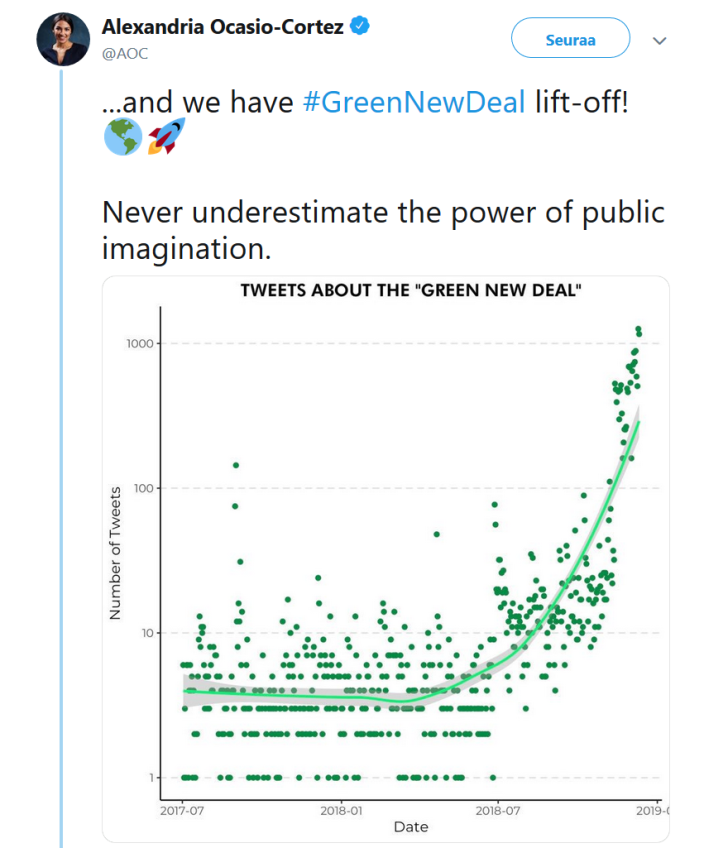Do you remember the New Deal, when Franklin D. Roosevelt saved America by taking control, over 5 years, of its economy? Or maybe have you only heard about the Green New Deal?
If neither of these rings a bell, you’re doubtless aware of the climate emergency in which we find ourselves, and the urge to change economic growth towards more climate responsibility.
Just like the New Deal, the Green New Deal comes from the United States. In 2007, Thomas Friedman called for the creation of a Green New Deal, adopting the same interventionist mechanisms as its predecessor while adapting them to the climate emergency.
For him, only government interventionism can fight environmental catastrophes, and thus allow radical change: passing from a market economy to a greener and more sustainable one.
Just like the one from 1933, this New Deal would have the ambition to revive the economy and give a job to everyone, except that instead of using fertilisers, taylorism and hydraulic dams, it would be done in a more integrated, sustainable and respectful way.
On January 19, 2007, Friedman was quoted on The New York Times:
“If you have put a windmill in your yard or some solar panels on your roof, bless your heart. But we will only green the world when we change the very nature of the electricity grid — moving it away from dirty coal or oil to clean coal and renewables. And that is a huge industrial project — much bigger than anyone has told you. Finally, like the New Deal, if we undertake the green version, it has the potential to create a whole new clean power industry to spur our economy into the 21st century.”
Through this statement, he was also pointing out the structural incapacity of every citizen, as numerous and voluntary as they might be, to truly stop the growth economy in which we live. Because even if we gather our efforts, we can never face those who are standing in front of us.
When we have anti-garbage campaigns funded by global companies (motivated by the evil will to push the plastic burden onto consumer’s shoulders) of 4 to 5 ads boasting the advantages of having a brand new car, all the while we’re still worrying about economic growth and the stock market’s evolutions, feeling helpless comes naturally. 76 years later, Friedman proposes to apply the interventionism recipe, as it has proven itself.
But one question hits my mind: what happened from 2007 to 2018, when the Green New Deal became a genuine topic of public debate? Indeed, it’s only during last autumn’s congressional campaigns that we truly heard of it.
To illustrate the rapid rise of discussion on the topic, let’s just take a look at a picture tweeted by the US Congresswoman Alexandria Ocasio-Cortez:
An argument in a campaign against Trumpism, or a concern motivated by a real fear for survival after this hot summer of 2018? The answer will be sought during this tenure of the US Congress.
In any case, as the Shutdown testifies, Democrats are ready to stick to their program. Hard.
A European version?
As always, Europeans look to the West instead of looking at their people, and are starting to think about following the model.
In his New Year’s speech, published on January 4th, Michel Barnier (EU negotiator on Brexit), presented his priorities for Europe. Lots of “must” and “should” but no “how”: this is how Ocasio-Cortez evoked the Green New Deal, and her European alter ego followed suit.
More precisely, Barnier said: “Europe could be the global leader in developing a circular economy, and in becoming the first fully electric continent by 2030, based on clean transport and electric vehicles.”
The ca. €109 million of EU grants allocated to Cluj-Napoca, notably for electrifying the tramway network, seems to be a good sign.
But, how to overcome endemic disagreements and disparities in priorities?
In reality, questions and examples are numerous: the Visegrád group, characterised by decreases in rule of law, and an aversion towards migrant quotas, Mediterranean countries that don’t know which problem to fight first (youth unemployment, refugees...), newcomers, and oldies struggling (Brexit, Merkel’s goodbye, Macron’s yellow jackets...), where is the priority?
Crisis, crossroads and priorities
The Yellow Jackets crisis is a textbook example and a forerunner for every state desiring to intervene in a sudden way to change the economy for a more climate-friendly one. However, this gives a fallacious argument to every state that is unwilling to bring any change in its economy. The same person who got angry in front of a picture of a melting glacier, for the #10YearsChallenge also protested on 17 November against the rise of the price of car fuel.
Without discussing the efficiency or the real aim of this measure (a topic for another entire article), I think we can draw a list of priorities here: purchasing power and the freedom of using one’s own car and, above all, inequalities between city-dwellers and those living in the countryside, the latter needing their cars to go to work, for example.
As this movement is becoming a carnage, we haven’t drawn the appropriate consequences of it: a change of direction without support cannot be fulfilled.
Because by scolding citizens, cataloging them as “refractory Gauls”, then telling them that you only need to “cross the street to find a job”, and then declaring that not all poor people are ’responsible’, Macron did nothing but stir up hatred.
Because while refusing to return on the reform of the wealth tax, he calls to the responsibility of each one. And strangely, the same people always seem to bear the responsibility. Hence the need to have a common goal, and a common direction, in which we will all be responsible.
On Roosevelt’s example, let’s give the power to the State, without giving a word to Finance. Or, to make it simpler: let’s mute the richest, and put in place a structured plan, an ecological transition, where everyone will have a place and where we’ll no longer worry about public debt, but about making the air breathable.
In her New Year’s speech, German Chancellor Angela Merkel said it all:
“We all want to resolve these questions in our own interest, and we can best do so if we also consider the interests of others. We have this overwhelming beauty, and yet we also know how vulnerable the basis of our existence is – vulnerable in a broad sense.
There is the vital question of climate change, the crucial question of managing and organising migration, the struggle against international terrorism. We all want to resolve these questions in our own interest, and we can best do so if we also consider the interests of others.”
One solution: local scale
How can we imagine for a single second that a global problem can be solved only at the level of states?
National sovereignty and differences in priorities between new and old economies will always be a barrier between two populations, but one thing is certain: the regional scale can be the one in which the first steps are made.
With multiple ongoing emergencies (terrorism, refugees, Brexit, climate, corruption ...) and minds too much on alert, we aren’t tackling the subject of federalism, although I am persuaded that it is the appropriate solution.
For now, let’s just do what we can with what we have, because we already have a lot. Let’s empower the EU to do more in this respect. Let’s give it the competences, via a review of the Treaties, for example.
Let’s make the change together with the people, and give genuine power to the Parliament. Let’s give it the legislative initiative. And let’s reform it deeply, so that it will no longer be a replica of national policies, and put the commitment of citizens above the political one.
Decrease the salaries of parliamentarians, increase tax control and control the activity of pharmaceutical and industrial lobbies (especially chemistry) in Brussels.
Let’s stop giving citizens the impression that at every level of power, we do not care about them. And then, we can work together, and change the deal.



Follow the comments: |
|
